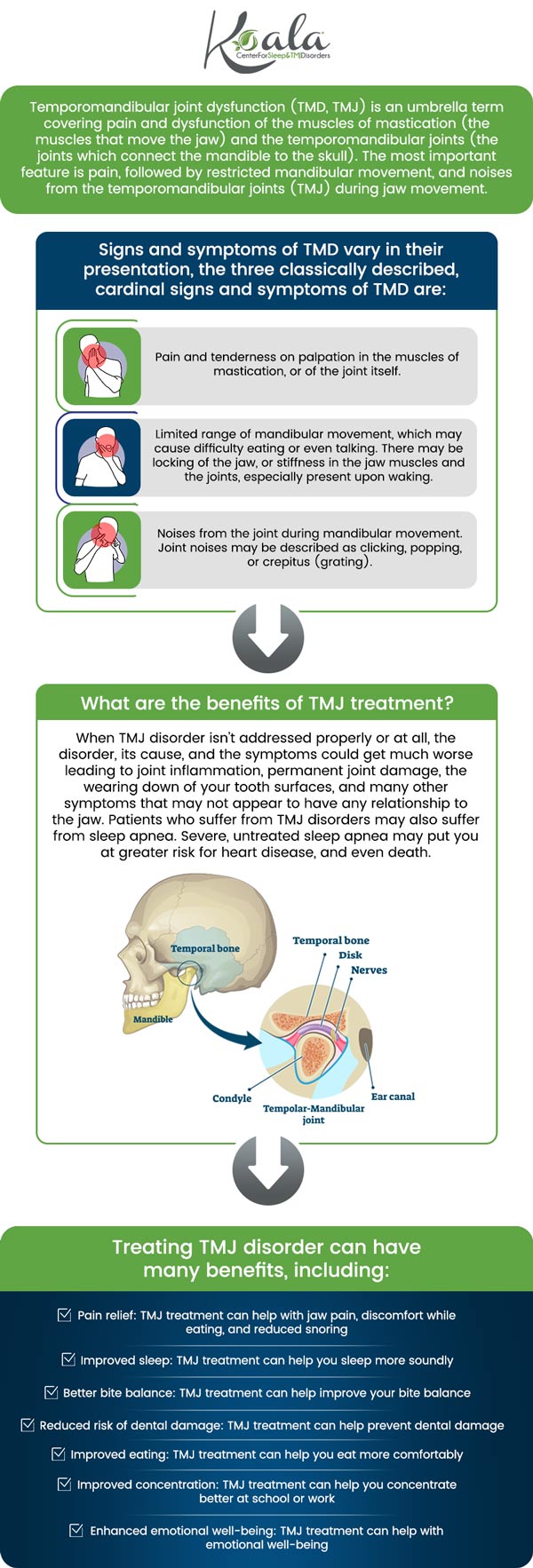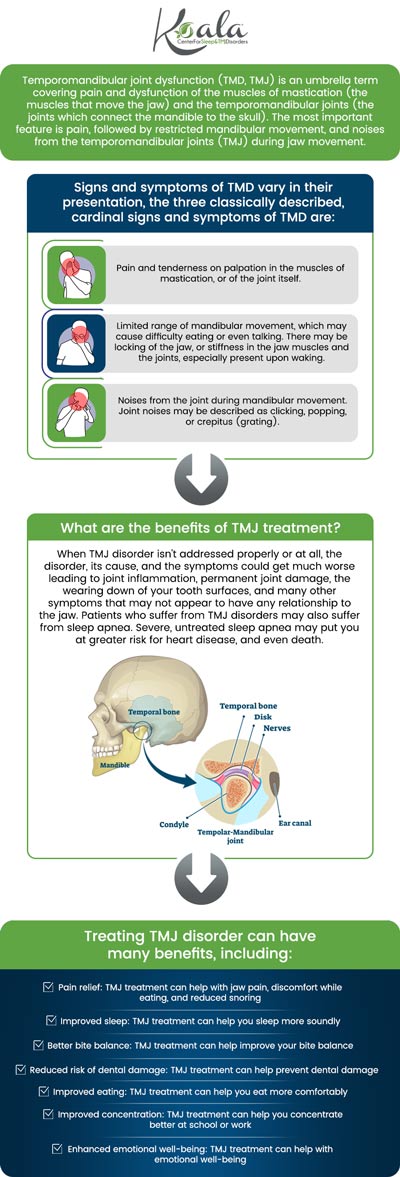13 Symptoms That Can Point To TMJ Disorder
TMJ disorder symptoms can include jaw pain, clicking or popping sounds when opening or closing the mouth, and difficulty chewing. Other common signs are headaches, facial pain, and neck or shoulder discomfort. If you’re experiencing any of these, it’s essential to consult a TMJ specialist at Koala® Center For Sleep & TMJ Disorders for a proper diagnosis. For more information, contact us or book an appointment online. We have convenient locations across the U.S. in Bloomington IL, Peoria/Dunlap IL, El Paso TX and Wausau WI.


Table of Contents:
Are you aware of grinding or clenching your teeth?
Do you wake up with sore, stiff muscles around your jaws?
Do you have frequent headaches or neck aches?
Does the pain get worse when you clench your teeth?
Does stress make your clenching and pain worse?
Does your jaw click, pop, grate, catch, or lock when you open your mouth?
Is it difficult or painful to open your mouth, eat, or yawn?
Have you ever injured your neck, head, or jaws?
Have you had problems (such as arthritis) with other joints?
Do you have teeth that no longer touch when you bite?
Do your teeth meet differently from time to time?
Is it hard to use your front teeth to bite or tear food?
Are your teeth sensitive, loose, broken, or worn?
Can TMJ disorders cause headaches?
How do TMJ disorders affect jaw movement?
Is teeth grinding and clenching related to TMJ?
Does TMJ cause dental problems?
Grinding or clenching your teeth, medically known as bruxism, is a common habit that often occurs unconsciously during sleep or stress. At Koala® Center For Sleep & TMJ Disorders, we specialize in identifying and treating bruxism, as it is frequently linked to sleep disorders and temporomandibular joint (TMJ) issues.
While occasional teeth grinding may seem harmless, chronic bruxism can lead to significant oral health and TMJ concerns. These include worn tooth enamel, increased tooth sensitivity, jaw pain or discomfort, persistent headaches, facial pain, and even damage to dental restorations or fillings. Additionally, untreated bruxism can contribute to more serious sleep disruptions and TMJ dysfunction.
Jaw stiffness and soreness can be more than just an inconvenience; they may indicate underlying conditions such as sleep disorders or temporomandibular joint disorder (commonly known as TMJ or TMD).
One primary cause of morning jaw soreness is nighttime teeth grinding or clenching, medically referred to as bruxism. Bruxism frequently occurs unconsciously during sleep and can result from stress, anxiety, dental misalignment, or untreated sleep disorders. Over time, this condition may lead to serious issues like chronic jaw pain, headaches, or damage to your teeth.
Headaches vary in intensity, duration, and frequency, and can stem from conditions such as tension headaches, migraines, or TMJ-related issues. Neck pain often arises from muscular strain, poor posture during sleep, degenerative conditions, or stress-related triggers connected to jaw misalignment and sleep disturbances.
If you regularly experience headaches accompanied by neck pain, it might indicate tension headaches resulting from tight muscles in the neck and jaw areas. Common triggers include prolonged sitting, stress, poor ergonomics, or incorrect sleeping posture. Additionally, migraine episodes, which involve throbbing pain and sensitivity to light and sound, can also be associated with neck stiffness or discomfort and may share links with TMJ disorders and disrupted sleep patterns.
When assessing facial, jaw, or dental pain at Koala® Center For Sleep & TMJ Disorders, one of the essential questions our specialists ask is whether your pain intensifies when clenching your teeth. Teeth clenching places considerable strain and pressure on your teeth, jaw muscles, and temporomandibular joints (TMJ), and can often worsen symptoms associated with temporomandibular joint disorders (TMD) or bite misalignment.
We understand how stress significantly contributes to jaw pain and temporomandibular joint disorder (TMJD). When you’re under stress, your body’s natural reaction often involves tightening muscles, especially those around your jaw, face, and neck. Over time, this constant tension can lead to increased jaw discomfort, difficulty chewing, headaches, and other TMJ-related symptoms.
If you experience clicking, popping, grating, catching, or locking sensations when opening or closing your mouth, you may have a temporomandibular joint (TMJ) disorder. The joint connecting your jawbone to your skull allows you to chew, speak, open your mouth, and perform other facial movements. When this joint or its surrounding muscles and ligaments aren’t functioning properly, symptoms like clicking or popping often occur, signaling a condition commonly known as Temporomandibular Joint Disorder (TMD).
Common signs of TMJ disorders include tenderness or pain around the jaw joint, clicking or popping sounds when opening or closing your mouth, headaches, facial discomfort, earaches, and limited jaw movement. Pain may range from mild to severe and can extend into your ears, neck, or shoulders, significantly impacting your daily life and sleep quality.
Other factors contributing to painful or limited jaw movement include dental issues such as impacted wisdom teeth, oral infections, muscle spasms, and certain inflammatory conditions. Rarely, jaw stiffness or pain might indicate more serious concerns, such as tumors or severe infections involving the jawbone or joint.
Have you ever experienced an injury or trauma involving your head, neck, or jaw? At Koala® Center For Sleep & TMJ Disorders, we understand that injuries in these areas can significantly impact your sleep quality, overall health, and daily comfort. Trauma to the head can range from mild concussions to more severe injuries, potentially affecting sleep patterns, cognitive function, balance, and overall well-being.
Neck injuries, such as whiplash or muscle strains, may result in persistent pain, stiffness, headaches, limited mobility, and disrupted sleep quality. Injuries to the jaw can directly contribute to temporomandibular joint (TMJ) disorders, causing difficulties in chewing, speaking, and even maintaining proper oral hygiene. TMJ issues can also lead to chronic facial pain, headaches, ear discomfort, and disrupted sleep.
Joint problems, such as arthritis, can significantly impact your daily life, comfort, and overall health, including your sleep quality and jaw function. Conditions like arthritis commonly cause symptoms such as pain, stiffness, swelling, and reduced mobility, and can affect multiple joints in your body, including your temporomandibular joint (TMJ). If you’ve experienced issues with other joints, it might indicate a broader joint condition or systemic issue that could also be contributing to sleep disturbances or TMJ disorders.
Having teeth that no longer make proper contact when you bite down can indicate a dental or orthodontic issue known as malocclusion, which often relates directly to temporomandibular joint (TMJ) dysfunction—a primary area of expertise at Koala. Malocclusion occurs when misalignment of the teeth or jaws prevents comfortable, even contact between upper and lower teeth, creating gaps or spaces and potentially leading to significant discomfort and oral health concerns.
Have you noticed that your teeth seem to align differently from day to day or at various times? Changes in how your teeth meet can be subtle yet significant, often signaling underlying issues related to sleep and jaw function. At Koala, we understand how shifts in your bite can indicate conditions such as TMJ disorders or nighttime teeth grinding (bruxism), both of which frequently disrupt healthy sleep patterns and overall comfort.
Bruxism, a common habit of grinding or clenching teeth, usually occurs during sleep. Many individuals wake up noticing their bite feels uneven or off due to muscle tension and joint strain from overnight grinding. Left untreated, bruxism can lead to further dental damage, persistent discomfort, and reduced sleep quality.
Experiencing difficulty when using your front teeth to bite or tear food may indicate underlying issues related to sleep disorders or TMJ (temporomandibular joint) dysfunction. We understand that discomfort with biting or chewing can often stem from problems with jaw alignment, muscle tension, or inflammation of the temporomandibular joint. Misalignment of the bite (malocclusion), worn enamel, tooth sensitivity, or even dental fractures can also contribute to difficulties using your front teeth effectively.
Loose teeth may result from chronic jaw tension, bruxism, and TMJ-related stress, leading to gum inflammation and bone loss around the tooth roots. These symptoms often signal deeper problems that require evaluation by a TMJ specialist to prevent further damage and promote optimal oral and overall health.
Broken or fractured teeth commonly occur due to repetitive nighttime grinding, jaw misalignment, chronic clenching, or accidental trauma. Damaged teeth can cause increased sensitivity, pain, and vulnerability to infections if left untreated. Similarly, worn-down teeth often indicate ongoing habits such as teeth grinding, bite misalignment, or erosion from acid reflux—a condition frequently seen in patients suffering from obstructive sleep apnea or other sleep-related breathing issues.
Addressing these dental signs early can prevent more complex oral health problems and improve your overall quality of life.
Yes, Temporomandibular joint (TMJ) disorders can indeed lead to headaches, and addressing this link is a core focus at Koala® Center For Sleep & TMJ Disorders. The temporomandibular joint connects the jawbone to the skull, enabling essential daily movements such as chewing, speaking, and yawning. When dysfunction, irritation, or inflammation affects this joint and its surrounding muscles, it can trigger pain and discomfort that radiates throughout the head, face, and neck.
Our patients who visit Koala frequently report headaches associated with TMJ disorders that often resemble tension headaches. These headaches typically manifest around the temples, forehead, or behind the eyes, and may be accompanied by jaw discomfort, clicking or popping sounds in the joint, difficulty opening or closing the mouth, and facial or neck muscle tenderness.
TMJ disorders can result in discomfort, pain, and functional limitations within the jaw joint and surrounding muscles, making even simple tasks challenging. Our patients often experience difficulty or discomfort when opening and closing their mouths, leading to limited jaw mobility and affecting basic functions like chewing, speaking, and yawning.
Patients experiencing chronic bruxism often report symptoms including jaw pain and stiffness, frequent headaches, earaches, facial discomfort, and clicking or popping sensations when opening or closing the mouth. Left untreated, persistent teeth grinding can lead to worn or damaged teeth, bite misalignment, and further aggravation of TMJ disorder symptoms. Additionally, underlying factors such as stress, anxiety, misaligned teeth, and sleep disorders (including obstructive sleep apnea) commonly contribute both to bruxism and to the development or worsening of TMJ issues.
Temporomandibular joint (TMJ) disorders can significantly impact both your dental health and overall quality of sleep. At Koala, we specialize in diagnosing and treating these interconnected conditions to help you achieve improved oral health, restful sleep, and a better quality of life.
The temporomandibular joint connects your jawbone to your skull and plays a crucial role in everyday activities such as chewing, speaking, and facial expressions. When this joint becomes dysfunctional or inflamed, it can lead to various dental and sleep-related problems.
If you are experiencing symptoms related to TMJ disorders, such as jaw pain, facial tension, headaches, teeth grinding, or sleep disturbances, the experts at Koala® Center For Sleep & TMJ Disorders can help. Early evaluation and customized treatment plans can effectively relieve your symptoms, protect your dental health, and restore restful sleep. Contact our team today to take the first step toward a healthier, more comfortable life.
Feeling trapped by chronic jaw pain, exhausted from the relentless cycle of sleepless nights, or frustrated with a CPAP you can’t tolerate? When you feel like you’ve tried everything and are left with no good options, that’s where we come in. The Koala® Center For Sleep & TMJ Disorders is your rescue. We specialize in providing advanced, non-surgical solutions that finally break the cycle. Stop suffering and let our expert team help you reclaim your days from pain and your nights from sleep apnea. For more information, contact us. We have convenient locations across the U.S. in Bloomington IL, Peoria/Dunlap IL, El Paso TX and Wausau WI.

Additional Services You May Need
▸ KoalaKIDZzz®
▸ Sleep Apnea
▸ Snoring
▸ TMJ Disorder
▸ Fatigue
▸ Sleep Disorders
▸ Weight Loss
▸ CPAP Alternative
▸ Oral Appliances




